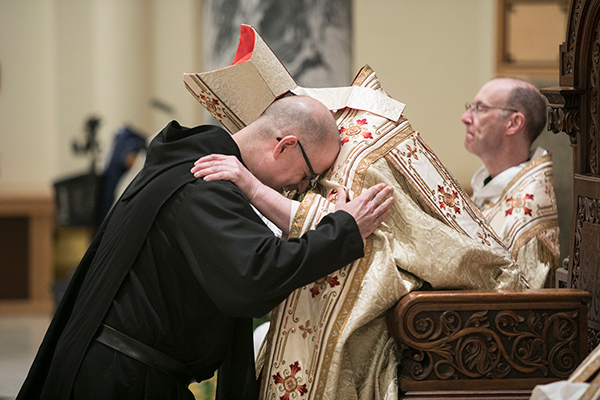Never Lose Hope
Fr. Adrian Burke, OSB
Thursday, June 8, 2023

As I write this, the monastic community is on its annual week of retreat. We don’t go anywhere; we remain in the house while, as best we can, refraining from our usual tasks to take more time to pray and reflect. Certain household and church tasks must go on, of course, but otherwise the monks are encouraged to use the time wisely to reset, recenter, and recommit to our monastic life of conversion and service.
In my own reflections this week, I’ve come to see with greater clarity that though my usual work entails a lot of preaching – I have in mind especially the retreat work I do and the spiritual conferences I present to seminarians and parish groups – I nonetheless struggle every day to practice what I preach. As much as I preach, this makes for a serious sense of failure when I take the time to reflect on how often I fall short of my ideals; it often haunts my thinking.
What I’ve come to believe, which, though it does not make my failures any less real, provides some measure of comfort and encouragement, is that Jesus loves me just as I am, today – even with all my weaknesses and wounds, my fears and anxieties, my immaturity and lack of spiritual freedom. In fact, Jesus loves those very aspects of me very much, oddly enough, and in a certain way, identifies with our suffering these things in order to heal us and give growth to what is lacking as we make our way through life. We mustn’t deny or run away from our weaknesses and wounds – we must face them and find Christ waiting for us in them!
The burdens of our imperfections are the basis of our spiritual poverty – and when I can face them, acknowledge them, and be OK with myself, even as I work hard with grace to understand them and act to overcome them, then I stand squarely in my truth as a person both loved by God and in need of God’s mercy – the two are the same in God. So, when I recognize and acknowledge my need for God’s mercy, I am more apt to turn to the One who empowers me such that I have the strength for everything (Phil. 4:13).
Relying on God is essential to the Christian life. To act justly, love tenderly (loving ourselves tenderly as well), and walk humbly with our God (Micah 6:8) requires that we admit our need for God’s grace, and know, at the same time, that God’s love for us provides what we need (Phil 4:19) to grow better at doing justice and loving tenderly, consenting to what God is doing in us by the power of his gospel (1 Thes 2:13). I am grateful to our holy father Saint Benedict for including at the end of his long list of “spiritual tools” a final item to encourage us when we inevitably fail to use well, or at all, the other 73 tools for good works: he bids us to never lose hope in God’s mercy!